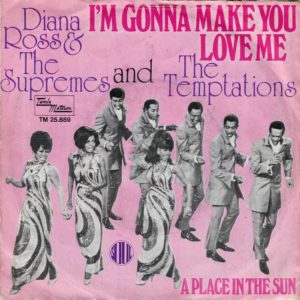Ever since I decided to make “I’m Gonna Make You Love Me” the focus of this week’s column I’ve been wracking my brain to think of another instance when the full lineups of two huge groups collaborated on a hit record. Yes, there have been supergroups like Cream and Crosby, Stills, Nash & Young made up of former members of various bands, but in this instance, we’re talking about the all the members of two groups who were at the top of their game getting together. If you can think of another example, please let me know in the comments.
“I’m Gonna Make You Love Me” is a Motown record, right? Well yes, but oddly its origins are pure Philly Soul. The song was written by Philadelphia legends Kenny Gamble and Jerry Ross, who was Gamble’s mentor. It has been claimed that Gamble’s partner Leon Huff had a hand in the writing but only Gamble and Ross are credited on the record. But the time the Supremes and the Temptations got around to it the song had been a hit twice already.
The original version of “I’m Gonna Make You Love Me” was recorded by Dee Dee Warwick and produced by Ross. In late 1966, the Mercury Records release attained the #13 spot on the R&B chart and crossed over to #88 on the Pop chart. Also of note on the Warwick release were the background vocals which were provided by Nick Ashford and Valerie Simpson. Although it was not her biggest hit, “I’m Gonna Make You Love Me” is the record most associated with Warwick because of the hit it later became for the Supremes and Temptations.
In all, Ross produced a total of ten recordings of “I’m Going to Make You Love Me.” Among the others were a 1967 version by Jerry Butler and a cover by Jay & the Techniques a year later. Aside from Ross, what all the versions had in common was the presence of Ashford and Simpson as background singers.
In 1968, “I’m Gonna Make You Love Me” was offered to Dusty Springfield who demurred but passed it along to Madeline Bell who was a background vocalist for her. In an interesting turning of the tables, Springfield ended up singing in the background for Bell on the record. When the record became a #26 hit, Bell, originally from Newark, New Jersey, got to come home from the U.K. with a hit record.
“It was great to go back to my hometown with a record in the charts. I was so happy to go home a success,” Bell said later.

And so the stage was set for the song’s greatest moment. The Supremes and the Temptations collaborated on an album called Diana Ross & the Supremes Join the Temptations and in 1968, “I’m Gonna Make You Love Me” became the lead single, although that wasn’t the plan at the beginning. The version of “The Impossible Dream” that the two groups had collaborated on was supposed to be the lead single, but when advance copies of the album hit radio stations the DJs started to play “I’m Gonna Make You Love Me.”
This time the record was produced by Frank Wilson and, wait for it, Nick Ashford. Diana Ross and the Temptations’ Eddie Kendricks shared the lead vocal duties, and Otis Williams of the Tempts contributed the spoken word section. The always-present Funk Brothers provided the backing track which also included the Detroit Symphony.
In case you were wondering, the Supremes and the Temptations never performed “I’m Gonna Make You Love Me” together live. When they appeared together on the legendary TCB special in December 1968, they sang “The Impossible Dream,” still scheduled to be the lead single at that point, to close the show. Both groups performed the song live on their own, however, the Temptations on the Ed Sullivan Show, and the Supremes at their farewell performance in Las Vegas.
“I’m Gonna Make You Love Me” was a huge hit for the Supremes and the Temptations, racing up to the #2 spot on the Billboard Hot 100 in January 1969 and reaching the same lofty perch on the R&B chart.





Comments